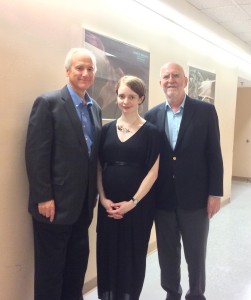
Emily St. John Mandel (center) spoke at the first Evening Readings for this season. She was interviewed by Leonard Lopate (right) and introduced by Joseph Cuomo.
Emily St. John Mandel read from her fourth novel, “Station Eleven,” on Sept. 29 evening, for the Queens College Evening Readings series in the LeFrank Concert Hall.
The audience, mostly women, seemed eager and interested to see Leonard Lopate, the host, interview Mandel.
Mandel is the author of three other novels: “The Lola Quartet,” “The Singer’s Gun” and “Last Night in Montreal.” “Station Eleven,” released on June 2, was a finalist for the National Book Award and is a national best seller.
“Station Eleven” is a dystopian novel about a Shakespearean Theater company, The Travelling Symphony. The theater troupe roams the wasteland 20 years after an apocalypse and performs for communities of survivors. The setting travels through time, showing life before and after a flu pandemic.
The plot connects five people, Arthur Leander, who dies of a heart attack during a production of “King Lear,” his wife Miranda, his friend Clark, a young actress named Kirsten of The Travelling Symphony, Jeevan, a man who tried saving Arthur’s life, and a violent prophet.
Mandel said she specifically wanted to write about a group of actors.
“I was interested in writing about what it means to devote your life to your art,” Mandel said. “It’s really about the art, because no one is making money anyway.”
The evening commenced with Joseph Cuomo, founding director of the Evening Readings, calling for a moment of silence to honor two writers who recently passed away, Oliver Sacks and E.L. Doctorow, who read at previous readings.
Afterward, Mandel was introduced and she read sections of her novel.
Lopate asked Mandel why she thinks dystopian novels are getting popular. Mandel said she heard two theories, one is about anxieties about the world ending, while another is economic inequality.
“Perhaps in a moment, when it seems the playing field isn’t particularly leveled, we secretly want to blow everything up and start over,” Mandel said.
Lopate said “Station Eleven” painted a hopeful picture, unlike other post-apocalyptic works, such as “The Road” or “The Walking Dead.” He asked Mandel if she purposely left mayhem out to show humans do not always descend to violence when disaster hits.
“I just felt that other writers really covered that ground very well, and I wasn’t particularly interested in writing a horror novel,” Mandel said. “It did seem to me more interesting to write about the period after that, the new culture that begins to emerge.”
Lopate asked about if the violent prophet was a comment on organized religion. She disagreed and instead, saw a character inevitably rising in a country.
“We are very heavily armed as a country. What we see around the world in a situation of political breakdown is in a power vacuum [where] warlords do emerge. People want some kind of leadership or people willing to step in and fill the gaps,” Mandel said.
At the end, Mandel held a book signing session in front of the concert hall.
The next QC Evening Reading will be on Oct. 27 with Mary Gaitskill. Admission to the events is $20, but free for those with a CUNY student ID.
For more information on the Evening Readings series, visit www.qcreadings.org.














